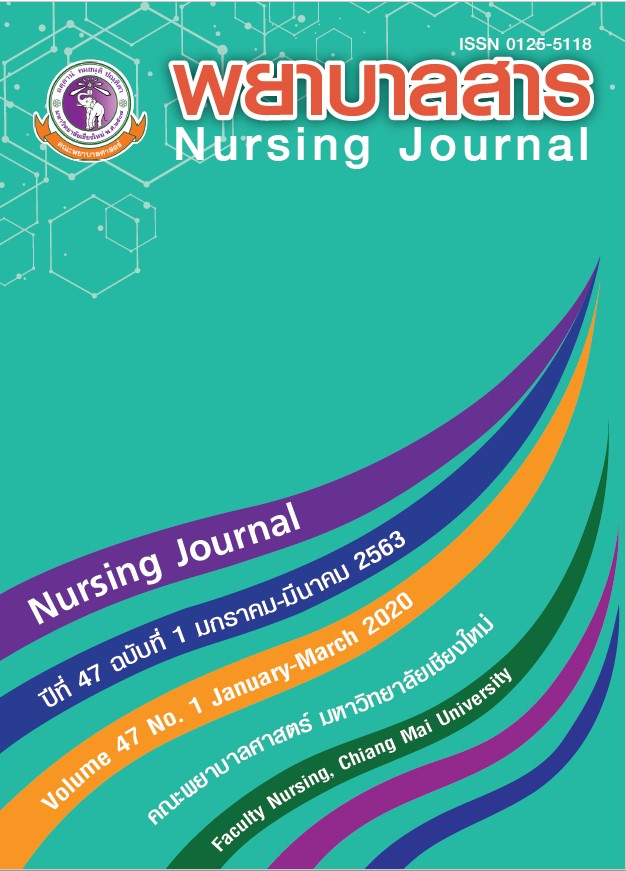Child-care Behaviors at Home and Related Factors Among Caregivers of HIV/AIDS Infected Children
Keywords:
Child-care Behaviors at Home, Knowledge, Social support, Caregiver, Children with HIV/AIDSAbstract
Treating HIV/AIDS infected children with antiretroviral drugs enables them to live healthily. They spend their lives mostly with their families at home, and can lead normal live. Therefore, child-care behaviors at home by caregivers are important. This correlational descriptive study aimed to examine HIV/AIDS infected child-care behaviors at home, knowledge of HIV/AIDS related child-care, social support, and the relationship between knowledge of HIV/AIDS related child-care and social support as well as HIV/AIDS infected child-care behaviors at home. The purposive samples were 85 HIV/AIDS infected child caregivers of children aged between 6 and 14 years who live with their families and have joined HIV/AIDS network group activities during June to December 2014. The research instruments include the Behaviors of HIV/AIDS related Child-care at Home Questionnaire, the Knowledge about HIV/AIDS Related Child-care Questionnaire and the Social Support Questionnaire. Data were analyzed using descriptive statistics and Pearson’s correlation coefficient.
The study results revealed that:
- The average score of the overall behaviors of HIV/AIDS related child-care at home of caregivers and knowledge of HIV/AIDS related child-care of caregivers were at a high level.
The average score of the overall social support was at a moderate level. - Knowledge of HIV/AIDS related child-care and social support were significantly positively correlated with HIV/AIDS infected child-care behaviors at home of caregivers
(r = .24, p < .05 and r = .47, p < .001 respectively).
The findings of this study could be implemented as a guideline for nurses to promote behavior in caring for children with HIV/HIDS at homes. Nurse should provide knowledge and social support for caregivers of HIV/AIDS infected children.
References
Bunthasit, W. (2008). Psychosocial support for children with HIV. In Kulkanya Chokphaibunkit (Editor), HIV / AIDS in children (pages 289-302). Bangkok: People Company Limited
(In Thai).
Bureau of Epidemiology, Department of Disease Control, Ministry of Public Health. (2015). Situation of AIDS patients in Thailand as of 31 October 2014. Retrieved from http://www.boe.moph.go.th/files/report /20141128_61345755.pdf (In Thai)
Chokphaibunkit, K. (2008). HIV / AIDS infection in children. Bangkok: People. (In Thai)
Chuntawan, R., Tiewkun, S., Phanchanprasit, C., Meesukho , J., Thaya, N., &Leawiriyakit, N. (2002). Prevention and mitigation of the effects of parents' HIV infection on children: participatory research. Research report Faculty of Nursing, Chiang Mai University (In Thai).
Control of AIDS and STDs Disease Control Chiang Mai Provincial Health Office. (2013). AIDS situation Chiang Mai Province, October - December 2012. Retrieved from http://www.chiangmaihealth.com/cmpho_web53/attachments/1058_AIDS255512.pdf. (In Thai)
House, J. S. (1981). Work stress and social support. Reading. MA: Addison- Wesley.
Klunklin, P. (2003). Child-rearing practices among primary caregivers of HIV-infected children aged 0-5 years in Chiang Mai, Thailand (Unpublished doctor dissertation). Chiang Mai University, Thailand.
Pathumwan, A. (1993). Application of Orem's Nursing Theory in Child Nursing. In Somchit Nuancharoenkul (Ed.), Self-care: Nursing science and art, First Amendment (page 187-206). Bangkok: VJ Printing (In Thai).
Phanchareon, C., Phitthayunont, T., & Tisakorn, U. (editor). (2002). AIDS in children. Bangkok: Chulalongkorn University (In Thai).
Phayaphrom, Y. (1996). Knowledge and practice in caring for infants of HIV-infected mothers, Master of Nursing Science (Nursing Care for Patient with Infectious Disease and Infection Control) Thesis, Faculty of Nursing, Chiang Mai University (In Thai).
Lamchang, S.,& Akarachinot, P. (1998). A study of the role of parents in caring for children with HIV. Nursing Journal, 25 (4), 55-67 (In Thai).
Prasert, P., & Chancharat, P.(1996). Problems and Impacts of AIDS on Children and Youth in Thailand. Journal of Public Health, 5 (1), 132-141 (In Thai).
Polit, D.F.,& Beck, C.T. (2010). Essentials of nursing research: Appraising evidence for nursing practice. (7th ed.).Philadelphia: Lipincol William & Wilkind.
Saisangchan, C., & Panjarat, A. (2008). Promoting the cohabitation of children affected by AIDS in shelters. In Pichai Chintana Phakdee (Editor), A Guide to promoting living together for children affected by AIDS in Public and Private Welfare Centers (pages 21-46). Bangkok: Agricultural Cooperative Assembly of Thailand (In Thai).
Sawadipanich, N. (2004). Health beliefs and health care behaviors of caregivers of HIV-infected children, Master of Nursing Science (Pediatric Nursing) Thesis, Faculty of Nursing, Chiang Mai University (In Thai).
Senarat, W., Photchanamat, C., Chanaokok, A., Chittaruech, C ., Chuntawan, R., Yimyam, S., & Namphom, N. (2006). Study of the orphan situation and children affected by HIV / AIDS in Thailand and help forms: A case study in the northern region. Research report Faculty of Nursing Chiang Mai University. Office of the Higher Education Commission Ministry of Education (In Thai).
Srimuang, P. (2011). Caring for children with HIV / AIDS at home by caregivers. Master of Nursing Science (Children Health Nursing) Thesis, Khon Kaen University (In Thai).
Wiriyasirikun, N. (2006). Influence of family relationships and care burden on care behavior of caregivers of school-aged children with HIV infection, Master of Nursing Science (Pediatric Nursing) Thesis, Prince of Songkla University (In Thai).
Wongsuya, J. (2008). Knowledge and practice in caring for children with respiratory infections of parents in Mae Sariang Hospital. Mae Hong Son Province, Master of Nursing Science (Pediatric Nursing) Independent Study, Faculty of Nursing, Chiang Mai University (In Thai).
UNAIDS. (2015). UNAIDS World AIDS Day report 2014. Retrieved from http://www.unaids.org/ en/resources/campaigns/World-AIDS-Day-Report-2014/factsheet.
Downloads
Published
How to Cite
Issue
Section
License
บทความที่ได้รับการตีพิมพ์เป็นลิขสิทธิ์ของวารสารพยาบาลสาร
ข้อความที่ปรากฏในบทความแต่ละเรื่องในวารสารวิชาการเล่มนี้เป็นความคิดเห็นส่วนตัวของผู้เขียนแต่ละท่านไม่เกี่ยวข้องกับมหาวิทยาลัยเชียงใหม่ และคณาจารย์ท่านอื่นๆในมหาวิทยาลัยฯ แต่อย่างใด ความรับผิดชอบองค์ประกอบทั้งหมดของบทความแต่ละเรื่องเป็นของผู้เขียนแต่ละท่าน หากมีความผิดพลาดใด ๆ ผู้เขียนแต่ละท่านจะรับผิดชอบบทความของตนเองแต่ผู้เดียว






